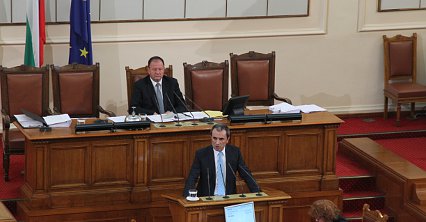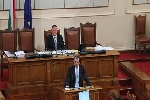
In his report before the Parliament Prime Minister Oresharksi points to several improvements which occurred during the rule of his government. He notes first that the government had stopped the practice of pressuring the business but said the investment climate is still not the best due to objective reasons such as the existing political tensions. Despite that the business does not fear any more of being targeted by sudden, “selective” checks by the controlling authorities.
The premier notes as contribution of the government the changes in the price formation of electricity and its lowering as a result. In the report he points to the acceleration of the big investment projects with visible results as the South Stream pipeline project, the South TAB gas corridor, the gas interconnectors with neighboring countries, the construction of the new nuclear reactor in Kozloduy. He underscores that the debts of the state towards the business had been paid almost in full and the absorption of European funds had been accelerated as well, thus minimizing the expected losses to 35 million euro instead of the previewed more than 270 million euro. The EU funds for agriculture had been completely absorbed, without any losses. The Agreement for Cooperation with the EU is expected to be approved by the cabinet in February. The tax agencies have recovered in collecting the dues. He explained that the new debt incurred by the government will be used to meet old obligations, not for frivolous spending as alleged by the opposition. He said the cabinet had succeeded from the previous government a debt of 14, 4 billion leva. Towards the end of 2013 the debt was lowered to 14, 1 billion leva.
Plamen Oresharksi gave a detailed overview of the bills proposed by his government that lower the burdens for the business saying the measures are more than 100. The government is working on law amendments against the monopolies and on improving the defense of the consumer. He mentioned the dialogue of the executive with local government had improved considerably. Funding for the municipalities had been increased and the administrative reform goes as planned. He stressed in particular the aggressive policies of the government undertaken in the social sphere by allocating more funds to increasing the birth rate, the raising of children, the assistance for heating expenses, to raising the minimal wage, the decision to apply annual indexation of the pensions etc. In his words the country is still experiencing difficulties, with investors shied away by the continuing political tensions, but the negative trends have been reversed and the first efforts to normalize the economy and the socio-political life have been made.

- 22/04/2021
The Parliament imposed a moratorium on concessions, real estate deals and appointments pending the election of a new cabinet or caretaker government - 16/04/2021
By 156 votes “in favour”, the National Assembly accepted the resignation of the Council of Ministers with Prime Minister Boyko Borisov - 15/04/2021
Speech by Mrs. Iva Miteva upon her election as a President of the 45th National Assembly - 15/04/2021
The Member of Parliament Iva Miteva was elected President of the 45th National Assembly - 15/04/2021
The Members of the 45th National Assembly were officially sworn in - 03/03/2021
The President of the National Assembly Tsveta Karayancheva and MPs attended the solemn fireworks-retreat on the occasion of the Liberation of Bulgaria - 03/03/2021
Every Bulgarian should preserve and honour the memory of those glorious ancestors, thanks to whom Bulgaria exists today, said the President of the National Assembly Tsveta Karayancheva in Gabrovo - 03/03/2021
Today we are on Shipka to pay our respects to all the heroes who sacrificed their lives for freedom, said the President of the National Assembly Tsveta Karayancheva after climbing Shipka Peak together with young people from all over the country - 02/03/2021
The Vice-President of the National Assembly Valeri Simeonov received an award from the Bulgarian Republican Self-Government in Hungary - 26/02/2021
The Parliament adopted at second reading amendments to the Measures Against Money Laundering Act
 Български
Български English
English
